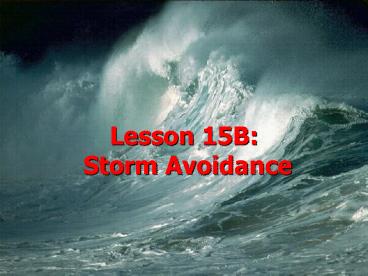Lesson 15B: Storm Avoidance - PowerPoint PPT Presentation
Title:
Lesson 15B: Storm Avoidance
Description:
National Data Buoy Collection Center. Provides real-time conditions throughout coastal ... To locate High or Low use: Stand with your back to the wind. Turn 15 ... – PowerPoint PPT presentation
Number of Views:40
Avg rating:3.0/5.0
Title: Lesson 15B: Storm Avoidance
1
Lesson 15B Storm Avoidance
2
Lesson 15B Storm Avoidance
- AGENDA
- Storm Avoidance
- Weather Reporting
- Weather Prediction
- Applicable reading Hobbs WB, App A
3
(No Transcript)
4
Storm Avoidance
1. Hurricane Season - June through November 2.
Procedure - Safest with respect to tropical
cyclones is avoidance. 3. Key Elements to
Determine - Position relative to storm center
axis - Path velocity of storms travel
5
Storm Avoidance
4. Cyclonic Storms - Deflected by the
corriolis effect travel in a clockwise
direction (Northern Hemisphere). 5. Storm
Division - Storm is divided into 2 parts -
Most Dangerous Semi-circle - side that is
right of storm center and direction of path -
Least Dangerous (Navigable) Semi-circle - side
that is left of storm center and direction of
path
6
Northern Hemisphere
7
Storm Avoidance
6. Safe Passage - in the Northern Hemisphere -
Avoid crossing the T avoid passing in front
of a storm going from Most to Least Dangerous
semi-circle - Most Dangerous Semi-Circle
Bring the wind on STBD bow, hold course
make best speed.
8
Storm Avoidance
6. Safe Passage - in the Northern Hemisphere -
Least Dangerous Semi-Circle Bring the wind on
STBD qtr, hold course make best speed. -
On Storm Track (ahead) Bring the wind to 160
deg R until a backing is noted in the wind
(indicating you are in the Least Dangerous
Semi-circle), then bring the wind on STBD
quarter, hold course make best speed.
9
Storm Avoidance
6. Safe Passage - in the Northern Hemisphere -
On Storm Track (behind) Avoid the center by
best practical course (southerly).
10
(No Transcript)
11
Ship Observation Reporting
Weather Observations - Ships are required to
take regular weather observations -
Observations taken hourly IAW
NAVOCEANINST. - Ships in company, OTC may
designate one ship to report
observations - In port with no manned weather
facility within 50NM
12
Ship Observation Reporting
Synoptic - Formatted weather message - Every
6 hours PRIORITY if surface wind speeds lt
33 kts, seas lt 12 feet. - Every 3 hours
IMMEDIATE if surface winds gt 33 kts
sustained, seas gt 12 feet. - Via plain voice
first indications of a tropical cyclone,
unusual or hazardous weather.
13
Ship Observation Reporting
Weather Observations - prepared by OOD - Type
of observation - Cloud Cover - Prevailing
visibility - Weather obstructions to
visibility - Sea level pressure in millibars
14
Ship Observation Reporting
Weather Observations - prepared by OOD
(cont.) - Dry bulb temp in degrees
fahrenheit - Dew point temp in degrees
fahrenheit - True wind direction speed -
Altimeter setting (if aircraft embarked) -
Remarks
15
Ship Observation Reporting
Weather Observations - prepared by OOD
(cont.) - Station pressure in inches of
mercury - Sea water temp (at sea water
injection) - Sea height, direction and
period - Ice (if applicable) - Clouds by
type, quantity, height
16
Services Available
- Tropical Cyclone Alert
- 2. High Wind and Sea Warning
- 3. Local Severe-Storm Warning
- 4. WEAX
- 5. OTSR - Optimum Track Ships Routing
17
Weather Prediction
- Broadcast WEAX Messages
- High Seas Warnings
- Offshore Marine Forecasts
- Coastal Marine Forecasts
- OPAREA Forecasts
- OTSR (Optimum Track Ship Routing)
- Tailored track recommendations
- National Data Buoy Collection Center
- Provides real-time conditions throughout coastal
U.S.
18
Weather Prediction
- 42039 PENSACOLA
- 56 NM South of Panama City, FL
- Measures
- Wind direction, speed
- Wave height, period
- Atmos. Pressure
- Air/Water Temperature
- Dew Point
19
Weather PredictionHeuristics
- Look for changes in wind direction
- Veering clockwise movement
- Backing counter-clockwise movement
- Watch 3 hour trend of barometer
- Note cloud type and direction
- Monitor dew point spread
20
Weather PredictionHeuristics
- Buys Ballot Law
- To locate High or Low use
- Stand with your back to the wind
- Turn 15º to the right
- The LOW is on your left, the HIGH on your right
- Red sky at night sailors delight
- Red sky at morning ... sailors take warning
21
Review/Summary
- Describe the difference between the dangerous
semi-circle and the navigable semi-circle. - What is OTSR used for?
22
Questions?

